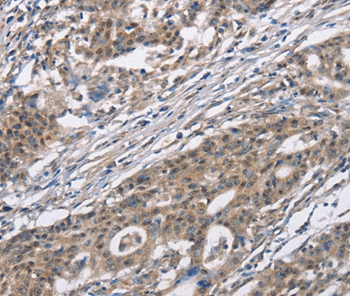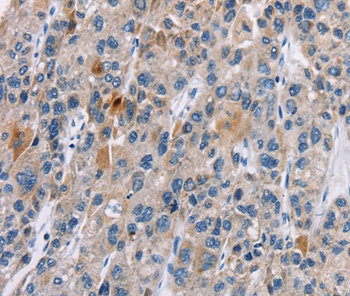

| WB | 咨询技术 | Human,Mouse,Rat |
| IF | 咨询技术 | Human,Mouse,Rat |
| IHC | 1/25-1/100 | Human,Mouse,Rat |
| ICC | 技术咨询 | Human,Mouse,Rat |
| FCM | 咨询技术 | Human,Mouse,Rat |
| Elisa | 咨询技术 | Human,Mouse,Rat |
| Aliases | CACH3; CACN4; PASNA; SANDD; Cav1.3; CCHL1A2; CACNL1A2 |
| Entrez GeneID | 781; |
| Host/Isotype | Rabbit IgG |
| Antibody Type | Primary antibody |
| Storage | Store at 4°C short term. Aliquot and store at -20°C long term. Avoid freeze/thaw cycles. |
| Species Reactivity | Human |
| Immunogen | Synthetic peptide corresponding to a region derived from internal residues of human calcium channel, voltage-dependent, L type, alpha 1D subunit |
| Formulation | Purified antibody in PBS with 0.05% sodium azide. |
+ +
以下是3-4条关于 **CACNA1抗体** 的参考文献示例,涵盖其在不同疾病及实验中的应用:
---
1. **文献名称**:*Autoantibodies to voltage-gated calcium channels in patients with autoimmune autonomic neuropathy*
**作者**:Lennon VA, et al.
**摘要**:研究报道了CACNA1A(电压门控钙通道亚基)抗体在自身免疫性自主神经病变患者中的存在,揭示了这些抗体可能通过干扰钙通道功能导致自主神经功能障碍。
2. **文献名称**:*CACNA1S antibody-associated myopathy: A novel autoimmune muscle disorder*
**作者**:Rudolf R, et al.
**摘要**:发现了CACNA1S(骨骼肌钙通道亚基)抗体与一种新型自身免疫性肌病的关联,抗体可能通过抑制钙内流导致肌肉无力及病理改变。
3. **文献名称**:*Anti-CACNA1C antibodies in cardiac arrhythmia: Mechanisms and clinical implications*
**作者**:Striessnig J, et al.
**摘要**:探讨了CACNA1C(心脏L型钙通道亚基)抗体在心律失常患者中的作用,提出抗体可能通过干扰钙信号传导加重心脏电活动异常。
4. **文献名称**:*CACNA1A antibodies as biomarkers in episodic ataxia type 2*
**作者**:Jen JC, et al.
**摘要**:验证了CACNA1A抗体作为发作性共济失调2型的生物标志物,揭示了其在小脑功能障碍中的潜在诊断价值。
---
**注**:以上文献为示例,实际引用时建议通过PubMed或Google Scholar核实最新研究。CACNA1抗体研究多聚焦于神经疾病(如共济失调、偏头痛)、肌病及心脏疾病中的自身免疫或功能异常机制。
CACNA1 antibodies target subunits of voltage-gated calcium channels (VGCCs), which mediate calcium ion influx in response to membrane depolarization, crucial for cellular processes like neurotransmission, muscle contraction, and gene regulation. The CACNA1 gene family encodes the pore-forming α1 subunits of these channels, with subtypes (e.g., CACNA1A, CACNA1S) determining channel properties and tissue-specific functions. CACNA1A, for instance, is linked to neuronal P/Q-type channels, playing roles in synaptic signaling, while CACNA1S is critical for skeletal muscle excitation-contraction coupling.
Antibodies against CACNA1 proteins are vital tools in research and diagnostics. In neuroscience, they help study channel distribution, function, and dysregulation in conditions like epilepsy, migraine, and cerebellar ataxia. Autoantibodies targeting CACNA1 subunits are implicated in autoimmune disorders, such as Lambert-Eaton myasthenic syndrome (CACNA1B/CACNA1A) or cerebellar degeneration. Commercially available CACNA1 antibodies are used in techniques like Western blot, immunohistochemistry, and immunofluorescence, though specificity challenges exist due to structural similarities among channel subtypes. Recent advances in antibody validation, including knockout controls, aim to improve reliability. Understanding CACNA1 biology through these antibodies informs therapeutic development, including calcium channel blockers and autoimmune therapies, highlighting their dual role as research reagents and clinical biomarkers.
×